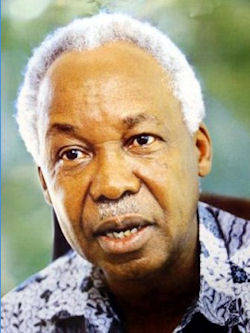Julius Kambarage Nyerere
 The political ideology of Tanzania cannot be discussed without describing the influences of Julius K. Nyerere. Nyerere was instrumental in formingand leading the Tanganyika African National Union (TANU). From this point, Nyerere lead the six-year campaign for his country's freedom and in so doing came to be recognized as the "Father of the Nation, Mwalimu Nyerere. Mwalimu is the Kiswahili word for teacher and is used affectionately in reference to Nyerere.
The political ideology of Tanzania cannot be discussed without describing the influences of Julius K. Nyerere. Nyerere was instrumental in formingand leading the Tanganyika African National Union (TANU). From this point, Nyerere lead the six-year campaign for his country's freedom and in so doing came to be recognized as the "Father of the Nation, Mwalimu Nyerere. Mwalimu is the Kiswahili word for teacher and is used affectionately in reference to Nyerere.
President Nyerere was a pioneering leader for freedom and self-government in Africa. Many African leaders sought his guidance as they crafted their own new societies. President Nyerere dedicated his life to a vision rooted in the belief that all people have a responsibility to protect those who cannot protect themselves. He practiced this ethic personally, aiding not only courageous African leaders but also ordinary victims of regional conflict; he opened Tanzania’s borders to refugees from wars in Mozambique, Rwanda, Burundi, Congo, and Uganda.
Mwalimu Julius Kambarage Nyerere, son of Chief Nyerere Burito of the Wazanaki, was born on 13th April, 1922, at Butiama, a village 26 miles outside Musoma Town in Northern Tanzania, near Lake Victoria. Though a son of a chief, his thinking was not affected by chiefly privileges. Rather the democratic process influenced him. This upbringing laid a firm foundation for Nyerere’s exemplary national leadership.
Nyerere walked to Musoma at 12 years of age to begin schooling at Government Primary School at Mwisenge. He joined Tabora Government Secondary School and passed Standard Ten Territorial Examination. He was a School Senior House Prefer and a member of School’s Boy Scouts Troop.
He was sent on scholarship to Makerere University College in Uganda. He was awarded a Diploma in Education, specializing in the teaching of Biology and English. He was awarded a scholarship to Edinburgh University in Scotland where he graduated with a Master of Arts Degree. Throughout his school career, Nyerere participated in debates on different subjects pertaining to people’s development besides his outstanding academic work.
On return from Edinburgh to what was then the Trust Territory of Tanganyika, Nyerere resumed teaching, this time at a leading school, St. Francis College at Pugu near Dar es Salaam. He was teaching History, English and Kiswahili. Besides teaching, he was actively involved in community activities outside school.
While teaching at St. Mary’s Tabora, he helped in establishing a co-operative shop in Tabora Town in order to fight exploitation. He also accepted to serve as a branch secretary of the Tabora branch of the African Association. Through such activities, he became very popular and earned the confidence and respect of the people he worked with.
In 1954 he became a founding member of Tanganyika African National Union (TANU) and was elected the first President of the Nationalist Party. On 22 March 1955, while still teaching at St. Francis College, now Pugu Secondary School, Mwalimu Nyerere was faced with the choice between teaching and full time politics. He chose politics and thus resigned his teaching post. He visited New York and addressed the Trusteeship Council of the United Nations in New York.
In 1960, Nyerere returned unopposed in the second General Elections. On this occasion, he was asked by the Governor to form the country’s first Council of Ministers with an elected majority, and he become the first Chief Minister.
Nyerere struggled with the concept of democracy: in his view the Western notion implied a win-lose system in which different interest groups sought to maximize their power and influence at the expense of others. An African system implied the consensus of a moral community in which the welfare of all was considered. To approximate the latter, amendments to the constitution formally instituted a one-party state. It is doubtful that most of his colleagues shared Nyerere's philosophical orientation. but they had no difficulty in accepting the change: a one-party system confirmed their oligarchic experience and their certainty that as leaders of the independence movement they had a right to rule.
Nyerere, however, was not fully satisfied. He saw signs of an incipient class division in the country, not only between well-off party and government leaders on the one hand and peasants on the other, but also between urban and rural Tanzanians and among the peasantry where the structure of rewards for enterprising farmers was leading to significant economic differentiation in the rural areas.
A basic tenet in Nyerere's philosophy was equality, and after tentative writings on socialism in the early 1960s he explicitly urged the institution of a socialist economy and society in the Arusha Declaration of 1967 and other official expressions. Like his conception of democracy, Nyerere's idea of socialism was based on his perception of traditional African communities.
He remained uncorrupted by fame or position throughout his life. Nyerere died October 14, 1999.
|
NEWSLETTER
|
| Join the GlobalSecurity.org mailing list |
|
|
|

